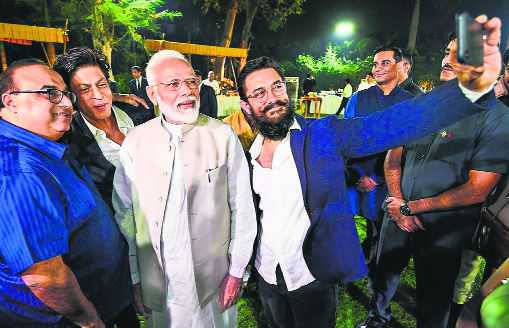AVIJIT PATHAK
Sociologist
The other day a student of mine showed me a film on Gandhi — Rajkumar Hirani’s latest one. It is a short film, and, as we are told, it was because of PM Modi’s eagerness that Bollywood stars — from the three Khans to the likes of Ranbir Kapoor, Alia Bhatt and Kangana Ranaut —came forward, and did something ‘meaningful’ for the Mahatma and the nation. I saw the film: well- dressed/well-fed stars reading a set of messages of Gandhi relating to ahimsa, forgiveness, truth, etc. Through my silence I was possibly trying to hide from my student that I was agitated. And then, he took me to yet another video showing some casual moments that Modi shared with these celebrities. The fragrance of affluence, the taste of power, jokes and laughter, and, of course, the selfie episode: I saw the Bollywood version — and blessed by PM Modi — of celebrating Gandhi. I was sad. For how long do we continue to degrade and trivialise him? Yet, I felt that instead of being merely agitated, I ought to understand this phenomenon: the alliance of Bollywood stardom, political establishment and mass culture.
I wish to make three points. First, as cultural theorists have often argued, in the age of ‘culture industry’ with the massification and standardisation of people’s choices, everything becomes some sort of entertainment. Hence, everything, be it music, theatre, news, film or literature, has to be reduced to the logic of mass consumption. No wonder, it trivialises the serious, and in the name of the ‘popular’, undermines any meaningful reflection and engagement. It promotes depthlessness. Hence, it is not surprising if Gandhi too is reduced to an object of entertainment, and if these pop stars ‘promote’ him with a feel-good orientation, the brand, as it is argued, would sell. Yes, Salman Khan sells a soft drink, and he can also remind us of Gandhi’s greatness. Or for that matter, if Aamir Khan with his new look speaks of Gandhi, we must be grateful to him that he has made the Mahatma popular!
Second, in our times the nature of politics too has changed drastically. When politics becomes a product, techno-managers are hired and paid heavily to create and promote the image of the messiah of the political establishment. He has to be portrayed as the perfect all-rounder: a world leader charming the likes of Donald Trump, a nationalist always ready to silence the ‘enemy’ state, a spiritual person finding the necessary time to meditate at Kedarnath, an environmentalist cleaning the Mamallapuram beach, and, above all, a techno-friendly darling comfortable with youngsters and Bollywood/cricket celebrities. Hence, the ease with which he cracks jokes, and that despite his busy schedule, manages to spend ‘quality time’ with these stars further promotes the image of the messiah.
Third, we are also passing through a time when the poverty of creatively nuanced critical thinking has become the new normal. We witness this dullness among many of our ‘star’ television anchors on ‘nationalist’ channels. This dullness can take you closer to the centre of power. And our Bollywood stars are not particularly known for their intelligence or critical thinking. And hence, they would recite a passage from Gandhi’s work like a mantra — the way they deliver dialogue in the Karan Johar film, express their gratitude to the PM, and see him as the best possible leader the nation has ever found. No word would be uttered against the might of majoritarianism, the growing fear among the minorities, and the economic crisis affecting the large section of the Indian population. The system absorbs the media and the entertainment industry.
Hence, the inevitable has happened. Gandhi has been trivialised. Because it is difficult to live with the questions he raised, the ideals he lived for, and the critical consciouness he generated. Hence, it is safe to reduce him to a fossilised ‘Bapu’, transform his nuanced experiments with truth into ritualistic mantras, and limit him to mere symbolism — his spectacles and spinning wheel. No wonder, even though Gandhi sought to reduce himself to ‘zero’, and gave tremendous importance to austerity, Salman Khan could still talk about him, despite his constant calculation of the money he would earn for his next film. And irrespective of the not-so-refined jokes Kapil Sharma makes on his show, he could still manage to have a nice time with the PM on the occasion of the release of the film. And ‘intelligent’ Aamir Khan could afford to remain silent about lynching or the violation of rights in Kashmir. Who would tell him that it was in 1946 that Gandhi, with his frail body, was walking through the villages of Noakhali to restore peace, and cross-religious dialogue, and the ruling regime does not seem to have learned anything from his finest experiment with truth? Gandhi as a dissenter, Gandhi as a nonviolent socialist, Gandhi as a seeker of truth, Gandhi as an anti-establishment practitioner: neither the political establishment nor Bollywood celebrities would like to engage with.
Hence, when they touch Gandhi, they trivialise him. I don’t know if it is possible for us to realise the politics of this mass deception. At a time when we keep consuming all sorts of media spectacles, and when soap operas replace serious literature, thinkers and philosophers are over shadowed by actors and cricketers, and the dramaturgical performance of the messiah becomes seductive, it is not easy to feel how Tagore conversed with Gandhi, Romain Rolland engaged with the Mahatma, and in our times the likes of Medha Patkar retain the fire of Gandhi. Instead, it seems we get what we deserve: Bollywood stars teaching us about Gandhi, and enjoying their selfie moments with the PM.
Unlock Exclusive Insights with The Tribune Premium
Take your experience further with Premium access.
Thought-provoking Opinions, Expert Analysis, In-depth Insights and other Member Only Benefits
Already a Member? Sign In Now










